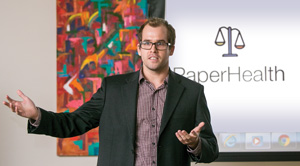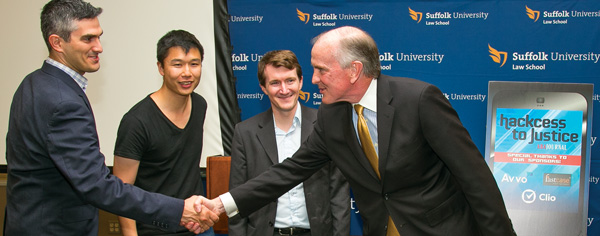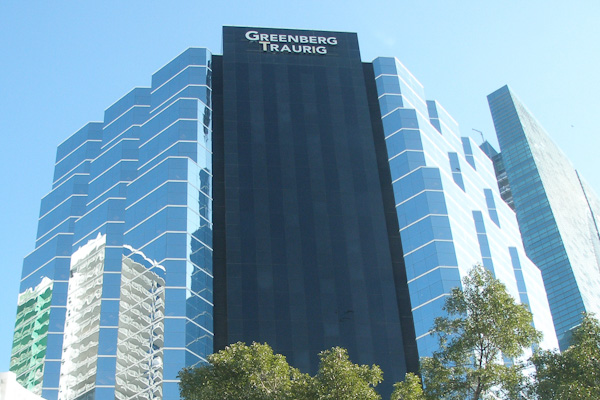Your ABA
Hacking takes center stage as a tool to improve access to justice

Attorney William Palin was the first-prize winner with his iOS app, PaperHealth. Photo by Kathy Anderson.
All these tools were created by lawyers and developers participating in the inaugural Hackcess to Justice legal hackathon. Held at Suffolk University Law School in Boston in conjunction with the ABA Annual Meeting, the hackathon's main purpose was to use technology to create tools that would expand access to justice for individuals who might not otherwise know whether they needed help or how to get legal representation.
The hackathon, co-sponsored by the ABA Journal and Suffolk University Law School, called for applications or programs that would solve one of several problems identified by the Legal Services Corp., including lack of adequate self-assessment tools to determine whether one needs representation; document automation; and creation of expert systems to assist attorneys and legal service providers.
"You are about to embark on the noblest of ventures," the LSC's president, James Sandman, told hackathon participants during his opening address. Sandman noted that over 65 million Americans qualify for free civil legal aid, and more than 80 percent of their civil legal needs had gone unmet.
"It is our goal to provide some form of effective assistance to 100 percent of the population," Sandman said.
With that in mind, participants set about creating tools that any person with a mobile device or computer could use to evaluate his or her legal needs.

James Sandman (right) congratulates the Due Processr team for winning third prize in the inaugeral Hackcess to Justice event. Photo by Kathy Anderson.
THE WINNERS
William Palin, an attorney in Cambridge, Massachusetts, won the $1,500 first prize for his iOS app, PaperHealth. The form automation app creates living wills and health care proxies and emails them to designated hospitals and health care providers."Most people have no advanced plans for medical emergencies," said Palin, who was inspired to create his app after his brother had surgery and found himself drafting a health care proxy at the hospital. Palin released the free app, which also features frequently asked questions and signature screens for signatories and witnesses, via Apple's App Store in late August.
The $1,000 second prize went to Disastr, an application for Android, iOS and the Web created by Matthew Burnett, director of the Immigration Advocates Network, and Adam Friedl, program and special initiatives manager at Pro Bono Net. The app provides information, resources, real-time news and alerts, and legal representation forms for people affected by natural disasters.
"We were heavily affected by Superstorm Sandy, and information like this was really lacking," Friedl said.
Third prize went to a team: David Zvenyach, general counsel for the Council of the District of Columbia; David Colarusso, staff attorney for the Massachusetts Committee for Public Counsel Services; and William Li, a computer science doctoral student at the Massachusetts Institute of Technology. The three created Due Processr, an interactive tool that allows users to determine their eligibility for indigent legal services in Massachusetts and criminal defendants to calculate their state prison sentences.
"When you go through the justice system, some things are better done by machines," Colarusso said. "Especially when it involves math."
CODING CODA
One day later, a panel of lawyers and legal hackers said coding and programming can be utilized to create or improve tools, programs and apps that provide valuable services to people in need of legal help.The panel, serving as a coda to Hackcess to Justice, was titled "Cracking the Code: Everything You Wanted to Know About Coding, Open Data & More But Were Afraid to Ask." The panelists agreed that the future for legal hacking was bright, and that they were optimistic about technology's ability to increase access to justice.
"I'm excited about legal service providers and organizations like Legal Aid that work with indigent populations," Zvenyach said. "This seems a very fertile ground for innovation. For instance, they still rely on pen and paper for a lot of work. The technology here is poor, and this is not how we should be doing modern-day litigation."



